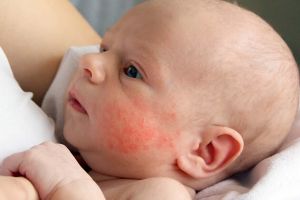Baby Eczema
Baby Eczema
Does My Baby Have Eczema?
Especially in the first few months, eczema may cause dry, flaky areas to develop on your baby’s skin.
Are you unsure if your baby’s sensitive, itchy rash is eczema? Your doctor will be able to inform you for sure. These questions and responses can assist you in determining what to look for.
What Does Baby Eczema Look Like?
Eczema affects every infant differently. It commonly appears as patches of red skin in babies with light skin. The rash in darker-skinned babies may appear purplish, brownish, or greyish. On babies with dark skin, eczema might be difficult to detect.
Dry, itchy, and rough areas are nearly always present.
The illness can affect babies everywhere on their bodies. Their arm and leg joints as well as their cheeks are typically affected.
It is simple to mistake cradle cap for baby eczema (also known as infant eczema or atopic dermatitis).
However, there are some significant variances.
The cradle cap is significantly less irritating and itchy. It commonly appears on the scalp, sides of the nose, eyelids and eyebrows, and behind the ears by the age of eight months.
Causes
It is known to run in families. If a parent has eczema, a child is far more likely to develop it as well.
A problem with the skin barrier, which allows moisture to escape and pathogens to enter, could possibly be the cause.
When the body doesn’t make enough ceramides, which are fatty cells, eczema can form. Your skin will lose water and become quite dry if you don’t get enough of them. Learn more about the causes of eczema.
Does Baby Eczema Clear Up on Its Own?
It frequently does. The majority of children will grow out of it before starting school.
Although it is uncommon, some children may get eczema in their adult years. Your baby may go months, possibly even years without experiencing any eczema symptoms. However, they may still have dry skin.
Learn more about children, allergies, and eczema.
Complications
Each infant is different. However, there are several frequent eczema triggers to stay away from, such as:
- Dry skin. It can irritate a baby’s skin. Low humidity is a factor, especially in the winter when homes are heated and the air is dry.
- Irritants. Scratchy wool clothing, polyester, fragrances, body soaps, and laundry soaps are just a few examples. All of these things can cause symptoms.
- Stress. When children with eczema are stressed, they may flush. This can result in inflamed, itchy skin. This, in turn, exacerbates their eczema symptoms.
- Sweat and heat. Both can aggravate the itching of baby eczema.
- Allergens. Some doctors feel that eliminating cow’s milk, peanuts, eggs, or certain fruits from a child’s diet can help regulate eczema symptoms. Remember that if your baby’s mother eats certain items before breastfeeding, your baby will be exposed to them. Discover the link between food and eczema flare-ups.
When to call a doctor
Consult your doctor if your baby’s eczema doesn’t improve and begin to clear up after using over-the-counter hydrocortisone medications for a week. Perhaps it’s time for a prescription.
If you notice a yellow or light brown crust or pus-filled blisters on top of your eczema, consult your doctor. This could indicate a bacterial illness that requires antibiotic treatment.
If your baby comes into contact with anybody who has cold sores or genital herpes, you should contact your doctor. Eczema can increase your child’s susceptibility to germs.
Treatment
Treatment at home
Give your child’s skin some tender loving care. The first step in treating their eczema is to do so. Try:
- Moisturizers. The best option is one that contains ceramides. Available without a prescription and over the counter from your local pharmacy. Otherwise, using a decent moisturiser, fragrance-free lotion, or ointment like petroleum jelly multiple times each day will assist your baby’s skin keep its natural moisture. After a bath, apply immediately.
- A lukewarm bath. This moisturises and soothes the skin. It could also help with itching. Check that the water is not too hot! Keep the bath time to a minimum of 10 minutes. Soak some oatmeal in your baby’s bath, this will help relieve itching.
- Use unscented, gentle soaps for your body and laundry. Perfumed, antibacterial, and deodorant soaps can be harsh on a baby’s delicate skin.
- Clean carefully. Only use soap on your baby’s genitals, hands, and feet if they are dirty. Rinse the remainder of your child’s body.
- Drying off. Pat the skin dry. Don’t rub.
- Dress comfortably during the day. Your youngster should wear loose cotton clothing to reduce irritation from garments rubbing against the skin. Always wash your new baby’s clothing before putting them on them. Use a fragrance-free, mild detergent. Don’t overdress your child or use too many blankets to keep them warm. If they become hot and sweaty, their eczema may flare up. Learn more about natural baby skincare.
What to Do About Itching
Keep your child from scratching their irritated skin. Scratching can aggravate the rash, cause an infection, and make the affected skin thicker and leatherier.
Trim their nails frequently, and if possible, file away the sharp edges. Scratch mittens are also worn by some parents on their children’s hands. Others wear long socks tucked under a long-sleeved blouse to make it more difficult for a baby to remove them. More eczema skin care advice can be found in a slideshow.
Medication
Itching and irritation are treated with over-the-counter medications like hydrocortisone lotions and ointments. Check the directions and don’t use them for too long because the skin in the affected area will thin.
If other therapies fail, there are drugs that require a doctor’s prescription.


